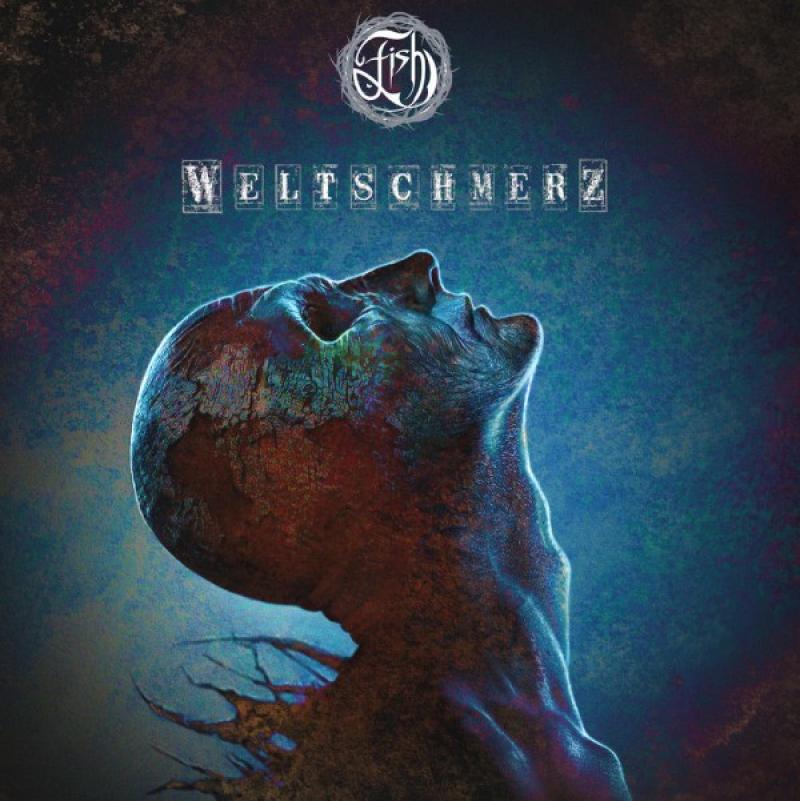ALBUM REVIEW: Weltschmerz – Fish
Weltschmerz is the final album from FISH after a 32 year career since leaving MARILLION. Since then, he has released a number of solo records and this, his eleventh, has taken five years to produce and record. It is very much his swan song.
FISH has acknowledged that Weltschmerz is autobiographical. He endured a lot of stresses during the recording process from the death of his father, his mother’s dementia and to his own ill health. The word Weltschmerz is German and means a feeling of melancholy and world-weariness. However, although those themes underpin many of the songs, this is not a depressing album. FISH rallies against troubles and injustices but his positivity is encapsulated in C Song (The Trondheim Waltz) where he repeats “I won’t let you bring me down, I don’t want to buy into your sadness”.
Lyrically, FISH is as strong as ever. His words were always a key part of MARILLION songs and the poetic muse is very evident here. In fact the songs draw you in closely to ensure you pick up the nuances of his prose. The opening track The Grace of God sets the scene nicely with a haunting intro (in which the words of a radiographer advising about an MRI scan are heard under the rhythm track). There are shorter, accessible songs such as This Party’s Over and Man with a Stick. The latter explores the various uses a stick can have-from lending support to a frail, elderly person, to its misuse in corporal punishment, as a weapon of control when handled (as a truncheon) by the police quelling the miners’ riots or in the shape of a gun in warfare.
The best of these shorter songs though has to be Garden of Remembrance which is a beautiful, piano-based lament to the tragedy of dementia. It is probably FISH’s most poignant vocal-delivery ever. The lyric in the chorus encapsulates the heartache of witnessing a loved one losing their memory “he’s lost between the here and now, somewhere that he can’t be found”. The accompanying video enhances the song with its depiction of a couple on a beach separated by glass and ending with FISH shedding a genuine tear. Apparently, his mother didn’t want to appear in the video but was only a few metres nearby during the filming.
For fans of prog there are several songs that will be welcome. In particular, the 17 minute opus, Rose of Damascus, is a highlight. The song focuses on one character (the aforementioned Rose) and her attempts to flee the worn-torn area. As FISH says “this wasteland where it’s a curse to be alive”. If ever a song portrayed the plight of Syrian refugees, this is the one. Maybe it should be required listening for governments and policy makers.
Musically, the sound is rich and full. There’s a pleasing array of instruments supplementing the standard rock format of drums, bass and guitar. For example, This Party’s Over has a melodic theme played on tin whistle, C Song (The Trondheim Waltz) benefits from a gentle accompaniment on accordion whereas a brass section embellishes Waverley Steps (End of the Line). There are also contributions throughout from eight members of a Scottish chamber orchestra. FISH’s vocals here are often understated and he refrains from the tendency to almost spit out any particularly venomous lyrics (a style that was often notable on his earlier works). In addition, there are sometimes passages where he recites, rather than sings, the words. FISH first used this approach during the MARILLION album Misplaced Childhood and it makes a welcome return here. The songs are supported by some excellent backing vocals by Doris Brendel, who has a rich pedigree in rock having worked with the likes of Gary Moore.
The album ends with the title track and, inevitably, there will be a tendency to focus on how FISH brings an end to this recording (and indeed his career). In summary, it encapsulates everything FISH has tried to achieve in his song-writing. When he sings “my words are my weapons”, one can certainly relate to that. This final song is a call to (peaceful) revolution, to rage against the injustices that are perpetrated and to ‘stand tall’. A fitting finale indeed.
Weltschmerz can be categorised as a prog album. However, it is not a throwback to the sounds characterised by early pioneers of this genre. For example, there are few lengthy guitar solos or passages of extended synthesisers. In addition, the time signatures are mainly straightforward. Many of the current proponents of prog like IQ, PENDRAGON or MOSTLY AUTUMN have a sound that is akin to the likes of PINK FLOYD or GENESIS. On this record FISH has, on the whole, eschewed that style (although the brilliant coda on Waverley Steps (End of the Line) is of that ilk. Hence, the overall feel of the album is definitely prog but perhaps a 2020 version of it: Prog 2.0 if you will.
Rating: 9/10

Weltschmerz is set for release on September 25th via Chocolate Frog Records.
Like FISH on Facebook.

